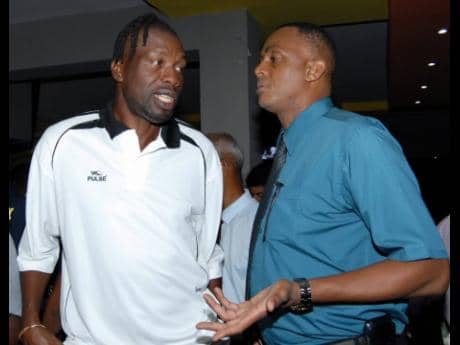**SOURCE: JAMAICA GLEANER-** THEY’RE ON call as supporting columns for West Indies cricket – much in the same way they were also bolstered by greats when they were up-and-comers – so, as far as they’re concerned, legends Ambassador Courtney Walsh and Sir Curtly Ambrose are convinced that recurring workshops, like those they conducted recently at the WI Cricket Academy, are required for structured development.
Stalwarts were always within reach during their time. One’s mettle was therefore always moulded by mentors – now the legendary duo believe this is a missing piece of West Indies cricket development.
“We simply have to find a way to get more senior players involved as is done elsewhere where most of the former players work through the ranks of various Academies,” said Walsh.
For validation, he recounted his experience (which he says he will never forget) when the likes of the larger-than-life Wes Hall, Charlie Griffith, and Clyde Walcott were all part of the training camp of the West Indies Under-19 team that toured England in 1982.
Stalwarts also guided the West Indies ‘A’ team in ’83 on a tour of Zimbabwe. In addition, playing the regional four-day Shell Shield competition, Walsh rubbed shoulders with Michael Holding (Jamaican teammate), Andy Roberts, Wayne Daniel, Joel Garner, and Malcolm Marshall.
“There has to be consistency – more of this is needed, not less,” he said.
The two enjoyed a three-day stint at the West Indies Academy.
The youngsters all warmed to what was being imparted, and the techniques of the legends were quite interesting.
“They were quite receptive,” said Ambrose, “because a number of them knew me when I was the bowling coach for the under-19 team (Floyd Reifer was coach) during the World Cup in the Caribbean. They know what I stand for, as discipline and hard work are required to shape and strengthen talent and to be successful.”
The first of Ambrose’s three days was spent on discussing legacy.
“Where we are now, is not where we are accustomed to being. We’re not playing as well as we used to or how we can play,” he said, a message the players warmed to.
“They are willing to make it better.”
The other two days were used for practice sessions – about cricket and not just bowling.
“For extended engagements I would emphasize life during and after cricket. Having experienced that, I would present the complete package because as a mentor you’re there to act as a father figure,” said Ambrose.
## OPEN-HOUSE DISCUSSION
The first of Walsh’s two days was an “open house discussion – and one-on-one sessions.”
The next day was about cricket and execution …”about how the first ball could be your best ball – and about the mindset and discipline required. That hasn’t changed – as once you get onto the field it’s up to you,” said Walsh.
His ideal mentorship programme is about arranged camps for not less than three weeks, with more one-on-one game improvement periods and general team training in 30 – 45 minute bursts.


